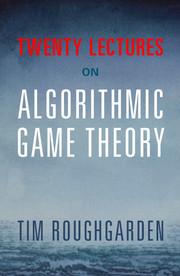Book contents
- Frontmatter
- Dedication
- Contents
- Preface
- 1 Introduction and Examples
- 2 Mechanism Design Basics
- 3 Myerson's Lemma
- 4 Algorithmic Mechanism Design
- 5 Revenue-Maximizing Auctions
- 6 Simple Near-Optimal Auctions
- 7 Multi-Parameter Mechanism Design
- 8 Spectrum Auctions 97
- 9 Mechanism Design with Payment Constraints 113
- 10 Kidney Exchange and Stable Matching
- 11 Selfish Routing and the Price of Anarchy
- 12 Over-Provisioning and Atomic Selfish Routing
- 13 Equilibria: Definitions, Examples, and Existence
- 14 Robust Price-of-Anarchy Bounds in Smooth Games
- 15 Best-Case and Strong Nash Equilibria
- 16 Best-Response Dynamics
- 17 No-Regret Dynamics
- 18 Swap Regret and the Minimax Theorem
- 19 Pure Nash Equilibria and PLS-Completeness
- 20 Mixed Nash Equilibria and PPAD-Completeness
- The Top 10 List
- Hints to Selected Exercises and Problems
- Bibliography
- Index
13 - Equilibria: Definitions, Examples, and Existence
Published online by Cambridge University Press: 05 August 2016
- Frontmatter
- Dedication
- Contents
- Preface
- 1 Introduction and Examples
- 2 Mechanism Design Basics
- 3 Myerson's Lemma
- 4 Algorithmic Mechanism Design
- 5 Revenue-Maximizing Auctions
- 6 Simple Near-Optimal Auctions
- 7 Multi-Parameter Mechanism Design
- 8 Spectrum Auctions 97
- 9 Mechanism Design with Payment Constraints 113
- 10 Kidney Exchange and Stable Matching
- 11 Selfish Routing and the Price of Anarchy
- 12 Over-Provisioning and Atomic Selfish Routing
- 13 Equilibria: Definitions, Examples, and Existence
- 14 Robust Price-of-Anarchy Bounds in Smooth Games
- 15 Best-Case and Strong Nash Equilibria
- 16 Best-Response Dynamics
- 17 No-Regret Dynamics
- 18 Swap Regret and the Minimax Theorem
- 19 Pure Nash Equilibria and PLS-Completeness
- 20 Mixed Nash Equilibria and PPAD-Completeness
- The Top 10 List
- Hints to Selected Exercises and Problems
- Bibliography
- Index
Summary
Equilibrium flows in atomic selfish routing networks (Definition 12.2) are a form of “pure” Nash equilibria, in that the agents do not randomize over paths. The Rock-Paper-Scissors game (Section 1.3) shows that some games have no pure Nash equilibria. When are pure Nash equilibria guaranteed to exist? How do we analyze games without any pure Nash equilibria?
Section 13.1 introduces three relaxations of pure Nash equilibria, each more permissive and computationally tractable than the previous one. All three of these relaxed equilibrium concepts are guaranteed to exist in all finite games. Section 13.2 proves that every routing game has at least one pure Nash equilibrium. Section 13.3 generalizes the argument and defines the class of potential games.
A Hierarchy of Equilibrium Concepts
Many games have no pure Nash equilibria. In addition to Rock- Paper-Scissors, another example is the generalization of atomic selfish routing networks to agents with different sizes (Exercise 13.5). For a meaningful equilibrium analysis of such games, such as a price-ofanarchy analysis, we need to enlarge the set of equilibria to recover guaranteed existence. Figure 13.1 illustrates the hierarchy of equilibrium concepts defined in this section. Lecture 14 proves worst-case performance guarantees for all of these equilibrium concepts in several games of interest.
Cost-Minimization Games
A cost-minimization game has the following ingredients:
• a finite number k of agents;
• a finite set Si of pure strategies, or simply strategies, for each agent i;
• a nonnegative cost function Ci(s) for each agent i, where s ∈ S1 × · · · × Sk denotes a strategy profile or outcome.
For example, every atomic selfish routing network corresponds to a cost-minimization game, with Ci(s) denoting i's travel time on her chosen path, given the paths chosen by the other agents.
Remark 13.1 (Payoff-Maximization Games) In a payoff-maximization Game, the cost function Ci of each agent i is replaced by a payoff function πi. This is the more conventional way to define games, as in the Rock-Paper-Scissors game in Section 1.3. The following equilibrium concepts are defined analogously in payoff-maximization games, except with all of the inequalities reversed. The formalisms of cost-minimization and payoff-maximization games are equivalent, but in most applications one is more natural than the other.
Information
- Type
- Chapter
- Information
- Twenty Lectures on Algorithmic Game Theory , pp. 173 - 186Publisher: Cambridge University PressPrint publication year: 2016
